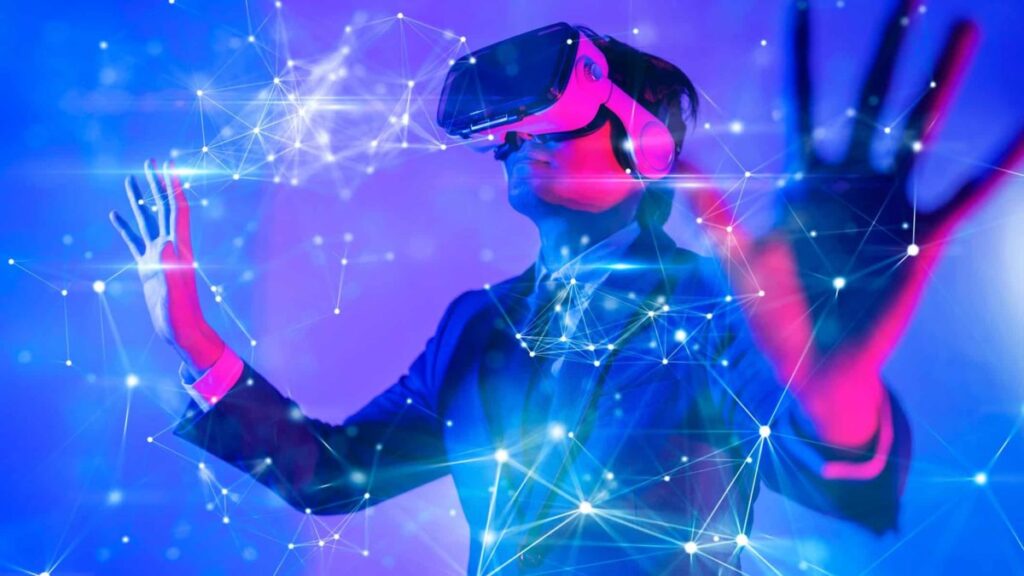Introduction:
As technology continues to advance at an unprecedented pace, the concept of the metaverse has emerged as a promising frontier. A metaverse can be described as a virtual reality space where people interact with each other and computer-generated environments in real-time. While the metaverse holds immense potential for entertainment, communication, and commerce, it also offers a unique opportunity to drive sustainability initiatives. In this blog post, we will delve into the new dimensions the metaverse can open for sustainability, transforming the way we approach environmental challenges.
- Virtual Collaboration and Remote Work:
The metaverse has the potential to revolutionize remote work by providing immersive virtual environments where individuals can collaborate without the need for physical travel. By reducing commuting and office space requirements, the metaverse can significantly minimize carbon emissions associated with transportation. Companies can host virtual meetings, conferences, and even entire virtual offices, enabling employees to work remotely while maintaining productivity and reducing their carbon footprint. - Sustainable Design and Prototyping:
Within the metaverse, designers and architects can create virtual models and prototypes of sustainable buildings, products, and infrastructure. This virtual environment allows for efficient experimentation and testing, enabling developers to identify and resolve potential sustainability issues early in the design phase. By optimizing resource usage, energy efficiency, and material selection within the metaverse, we can drive real-world sustainable development and construction practices. - Environmental Education and Awareness:
The metaverse can serve as a powerful tool for environmental education and awareness. Virtual reality experiences can simulate various ecosystems, showcasing the beauty and fragility of nature. By providing immersive experiences, individuals can gain a deeper understanding of environmental challenges and the importance of sustainability. Virtual classrooms, interactive simulations, and gamification techniques within the metaverse can engage and educate people of all ages, fostering a global mindset for sustainable living. - Sustainable Lifestyle Choices:
Virtual marketplaces within the metaverse can offer users a wide range of sustainable and eco-friendly products. From virtual clothing to digital assets, users can make conscious choices that promote sustainability. Additionally, the metaverse can incentivize sustainable practices by rewarding users for eco-friendly actions. For example, virtual currencies earned for engaging in sustainable activities can be exchanged for real-world incentives, encouraging individuals to adopt sustainable habits both virtually and in their everyday lives. - Climate Modeling and Predictive Analytics:
The metaverse can serve as a platform for advanced climate modeling and predictive analytics. By integrating vast amounts of environmental data, virtual environments can simulate climate patterns and their impacts on different regions. These simulations can help scientists, policymakers, and businesses make informed decisions to mitigate and adapt to climate change. Additionally, the metaverse can facilitate collaborative efforts in developing sustainable solutions by connecting experts and stakeholders from around the world.
The metaverse presents us with a new frontier for sustainability, transcending the boundaries of physical limitations. From virtual collaboration and sustainable design to environmental education and predictive analytics, the metaverse offers unparalleled opportunities for addressing global challenges. By leveraging the power of virtual reality and immersive experiences, we can shape a sustainable future. However, it is crucial to ensure that the development and implementation of the metaverse align with sustainable principles, prioritizing ethical considerations, energy efficiency, and equitable access. By embracing the metaverse’s potential, we can forge a path toward a greener, more sustainable world.
The Global Evolution of the Metaverse: How Implementations Will Shape Our Future

The concept of the metaverse has gained significant traction in recent years, capturing the imaginations of tech enthusiasts, innovators, and visionaries worldwide. As technology advances, the development and implementation of the metaverse are poised to transform various industries and revolutionize the way we live, work, and interact. In this blog post, we will explore how implementations of the metaverse are set to develop around the world, paving the way for a new era of digital experiences.
- Technological Infrastructure:
The implementation of the metaverse relies heavily on robust technological infrastructure. Governments and organizations worldwide are investing in the development of high-speed internet connections, 5G networks, and cloud computing capabilities. These advancements are crucial to ensure seamless connectivity, low latency, and immersive experiences within the metaverse. As countries race to enhance their technological infrastructure, we can expect the metaverse to become more accessible and widespread.
- Virtual Social Interactions:
One of the key aspects of the metaverse is its ability to facilitate virtual social interactions. As implementations progress, we will witness the emergence of virtual communities and social platforms within the metaverse. These platforms will enable people from different corners of the globe to connect, communicate, and collaborate in ways previously unimaginable. From virtual events and concerts to shared virtual spaces, the metaverse will redefine how we socialize and forge relationships.
- Virtual Commerce and Economy:
The metaverse has immense potential to reshape the world of commerce and economy. As implementations unfold, we can expect to see virtual marketplaces, digital currencies, and immersive shopping experiences. Brands and businesses will leverage the metaverse to offer virtual storefronts, allowing customers to browse, purchase, and interact with products in a virtual environment. The metaverse will also enable entrepreneurs to create and monetize virtual goods and services, leading to the development of a thriving virtual economy.
- Entertainment and Media:
Entertainment and media industries are set to undergo a paradigm shift with the rise of the metaverse. Implementations will bring forth immersive virtual reality experiences, interactive storytelling, and personalized content delivery. From virtual concerts and live performances to virtual reality gaming, the metaverse will blur the line between physical and digital entertainment. Content creators will have unprecedented opportunities to engage with audiences and explore new creative possibilities.
- Education and Learning:
Implementations of the metaverse will revolutionize the field of education. Virtual classrooms, interactive simulations, and immersive learning experiences will become commonplace. Students will have access to global knowledge networks, enabling collaboration and cultural exchange on an unprecedented scale. The metaverse will bridge geographical barriers, bringing education to underserved regions and fostering lifelong learning for all.
- Governance and Regulation:
As the metaverse expands, governments and regulatory bodies will face the challenge of establishing frameworks and guidelines to ensure ethical and responsible use. Questions regarding privacy, data security, intellectual property rights, and accessibility will arise. International collaborations and discussions will be vital in shaping the governance and regulation of the metaverse, striking a balance between innovation and protecting user rights.
Conclusion:
The development and implementation of the metaverse are poised to reshape our world in profound ways. As technological infrastructure strengthens, virtual social interactions thrive, virtual commerce flourishes, and education transforms, the metaverse will become an integral part of our daily lives. It is crucial for stakeholders to work together to address challenges and ensure the metaverse’s ethical and sustainable growth. By embracing this new digital frontier, we have the opportunity to unlock limitless possibilities and shape a future where the virtual and physical worlds seamlessly coexist.


